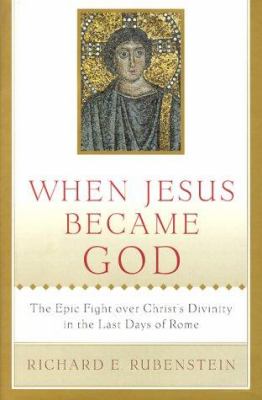The full title of this book is When Jesus Became God: The Struggle to Define Christianity During the Last Days of Rome.
Rubinstein manages the difficult job of making early Christian church debates about the nature of Christ easy-to-read with aplomb. The first fifty pages or so fairly clearly and efficiently explain the difference between the Arians and anti-Arians (who, essentially, debated whether Christ was man or God). By mid-text, however, the narrative seems far more concerned with the ebb and flow of the political arms of these debates than the theological elements.
It is not until the last 30 pages or so that Rubinstein reveals that what he has really been narrating is the long-trajectory development of the Nicene Creed, an oath of sorts intended to provide a foundational 'basic contract' of what Catholics (and later, Roman Catholics) believe. The book outlines disagreements that developed between the Arians and anti-Arians, particularly around the question of the relationship (and/or differences between) Jesus Christ and God in early Christian belief. Through a patient, sometimes laborious tracking of political contests (there was clearly no separation of Church and State during this time!) Rubinstein illustrates how church elders, theologians, and Roman imperial leadership fought for political and theological power. With the adoption of the Nicene Creed, and its evolution over the course of fifty years or so, the anti-Arians won - leading to the promulgation of concepts such as the Holy Trinity, with its complex singularity of and yet difference between God, Jesus, and the Holy Spirit.
Click here to read some excerpts.

No comments:
Post a Comment